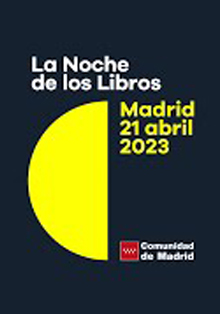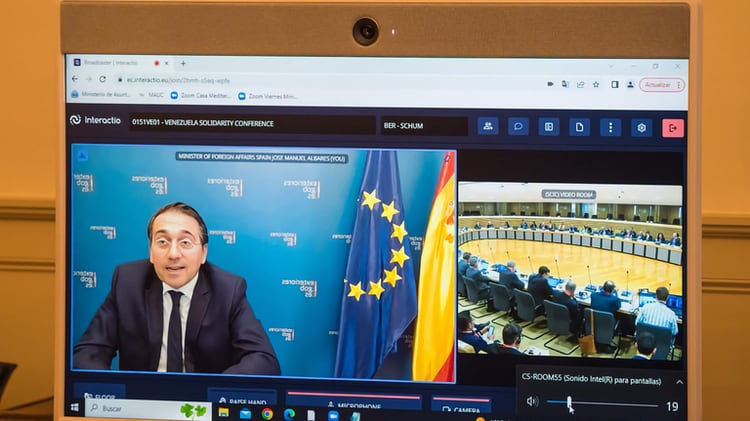Today 21 April is Book Night and the diplomatic cultural houses are celebrating it with numerous literary activities with meetings with writers and presentations of new books.
Casa América presents at 7 p.m. in its Miguel de Cervantes Hall the literary dialogue Noches de neón: postales nocturnas desde América Latina (Nights of neon: night postcards from Latin America). Each great metropolis has its own night-time postcard: Mexico City, Buenos Aires… They are known through the readings and experiences of writers who come from or have lived in them. How do you narrate the night of these cities? Participants: Valeria Correa, Argentinian writer, and David Toscana, Mexican writer. Free admission until full capacity is reached.
Casa Árabe presents the book Desde que me quedé sin dioses, by David de Juan Marcos, this evening at 7 p.m. in its Embajadores hall. Free admission until full capacity is reached.
The author and writer Mª Ángeles López de Celis will be taking part in the presentation. The author meets Momo, a Palestinian refugee from the Syrian civil war, in 2018, and decides to tell his story and that of his family: from the Palestinian Catastrophe of 1948, his childhood and youth in Damascus and the revolution of 2011, to prison, torture and exile, first to Denmark and then to Sweden, where he now works with teenagers fleeing the war. Halfway between novel, memoir and diary, this true story of a double exile is also an analysis of survivor’s guilt and the prejudices faced by an Arab immigrant in Europe.
For its part, the Centro Cultural de China (Calle General Pardiñas, 73) has prepared two activities for book lovers. At 6 p.m., the book Sanzijing or The Classic of the Three Characters, the Spanish version of a jewel of Chinese pedagogy and moral philosophy, will be presented in the company of the book’s translator Daniel Ibáñez and the Chinese history specialist Mariola Moncada. Written during the Southern Song dynasty (1127-1279), this work was born to embody the Neo-Confucianist ideal of bringing together in a short manual the quintessence of Chinese education, philosophy and history and formed the basis of children’s education in this Asian country for centuries.
Furthermore, this Friday at 5 p.m. and tomorrow Saturday at 11 a.m., this Cultural Centre is also holding a ‘pop up’ market of books by Chinese authors at its headquarters, with essential readings to get closer to Chinese literature and culture, from the classics to the latest novelties.
At 18:00, the Centro Sefarad-Israel presents a round table discussion entitled Stefan Zweig, in freedom? This year, the rights to the work of the writer Stefan Zweig have fallen into the public domain. For this reason, Centro Sefarad-Israel is proposing a discussion on the importance of the “liberation” of these rights, their consequences, the possible new translations of his work and the meaning of his “world” today. This round table will also serve as a reminder of the relevance of one of the most universal Jewish authors of the 20th century. Berta Vias Mahou, translator of Stefan Zweig’s work; Javier Gutiérrez, general director of VEGAP, and Javier Setó, director of Alianza Editorial’s “El libro de bolsillo” will take part. Free admission, prior confirmation at this link.
The Instituto Confucio of Madrid (Calle Goya, 10) invites you to a magical night under the moonlight at 8 p.m. in La noche de los libros. With the title Oh Moon, Oh Shadow, Professor Wang Keke will reveal to the audience the meaning of the moon in classical Chinese poetry and the actress Xiao Xirou will recite some poems in Spanish and Chinese.
The moon has been a source of inspiration in classical Chinese poetry. Wang Wei, Su Dongpo, Du Fu and Li Bai, among many others, have written to the moon in poems that celebrate its beauty and evocative power, but also express loneliness, nostalgia and the fleetingness of life. What makes this evening special is that you will be able to enjoy the musicality and rhyme of classical poetry, which does not work in exactly the same way as in Western poetry, since, among other things, patterns of rhythm are created by the difference in tones. Free admission until full capacity is reached.
The Instituto Francés is holding an Encounter with Emmanuel Carrère and Maite Rico at the Real Casa de Correos at 20.15. Free admission until full capacity is reached. Event in French with simultaneous translation into Spanish.
Emmanuel Carrère will participate in this evening to present his latest book published in Spain, V13. He will be interviewed by Maite Rico about his work as a whole, with special attention to his latest book, in the event entitled Y eso fue lo que pasó: ficción sin ficción. V13 refers to Friday 13 November 2015, when three jihadist attacks took place in Paris, including the one at the Bataclan. Emmanuel Carrère covered the historic trial of the attacks for almost a year to send his weekly chronicles to L’Obs. These chronicles are the basis of his latest book, which features the victims and the accused, the lawyers’ chats and the behind-the-scenes details.
The Instituto Italiano de Cultura of Madrid announces that this afternoon it will reopen its Library, completely renovated, with new spaces and new facilities for reading and experiencing Italian culture. It will now be possible to browse, read, study and consult the many volumes on art, architecture and literature, as well as the latest publications, which have been made available to visitors and lovers of Italian culture.
The programme of activities for the evening starts at 6 p.m. with a show for children and young audiences Rodar and Rodari – Stories that adults don’t understand, told by Simone Negrin (Age: 5 years and up). Bookings at prensa.iicmadrid@esteri.it. One hour later, there will be a dramatised reading of texts by Italo Calvino, by the actress Claudia Ferranti (adult audience). Bookings at biblioteca.iicmadrid@esteri.it.
Last but not least, the Instituto Rumano de Cultura of Madrid will organise a round table dedicated to the presentation of the book El viento, el espíritu, el aliento, by Andreea Răsuceanu.
The event will take place on Monday, 24 April at 7 p.m. at the Iván de Vargas Library, in the presence of the author, Andreea Răsuceanu, the translator of the book, José Francisco Arcenegui, the director of the Library, Pablo Quintanilla Rodríguez, and Maria Floarea Pop, director of the ICR Madrid. Andreea Răsuceanu will also take part in a meeting with students from the Faculty of Philology at the Complutense University of Madrid on Wednesday 25 April at 18:30.







